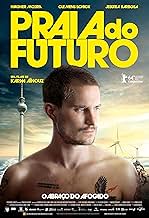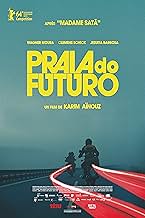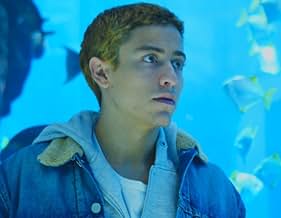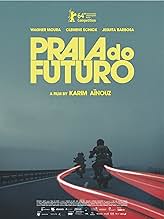IMDb-BEWERTUNG
6,3/10
3509
IHRE BEWERTUNG
Füge eine Handlung in deiner Sprache hinzuShortly after failing to rescue a drowning man, Donato meets Konrad, a friend of the victim. They soon begin a relationship which seems doomed from the start, while Donato's past catches up ... Alles lesenShortly after failing to rescue a drowning man, Donato meets Konrad, a friend of the victim. They soon begin a relationship which seems doomed from the start, while Donato's past catches up with him.Shortly after failing to rescue a drowning man, Donato meets Konrad, a friend of the victim. They soon begin a relationship which seems doomed from the start, while Donato's past catches up with him.
- Regie
- Drehbuch
- Hauptbesetzung
- Auszeichnungen
- 11 Gewinne & 20 Nominierungen insgesamt
Demick Lopes
- Capitão Motta
- (as Démick Lopes)
Yannik Burwiek
- Filho de Heiko
- (as Yannik Burwieck)
Jesuíta Barbosa
- Ayrton - 18 anos
- (as Jesuita Barbosa)
Empfohlene Bewertungen
As beautiful a cinematic essay on the subject of fear as I've seen in a while, Karim Aïnouz's "Futuro Beach" manages to cover a plethora of fears common to the human condition - fear of solitude, fear of commitment, fear of rejection, fear of change, fear of death (hell, even fear of water is covered) – and the remarkable human ability to overcome them.
Donato (Wagner Moura) is a lifeguard at a Brazilian Beach who is only able to save one of two German tourists from drowning. Having never had to face death before, he reaches out to the surviving tourist Konrad (Clemens Schick) and soon finds himself in a complex relationship that leads him to question who he is and what he wants from life. Faced with making difficult choices, including the decision to abandon his younger brother and mother and relocate to Germany to join Konrad, Donato finds that his fears have followed him. Eventually isolating himself from Konrad and still unable to deal, he finds himself living a solitary life until he comes face-to-face with his past. Only then can he finally begin the journey of self-acceptance necessary to move beyond the fears that have held him back from experiencing a full life.
Cinematographer Ali Olay Gözkaya's stunning photography captures the natural beauty of the Brazilian and European locations and enhances the story's mood and tone. Performances are strong from the two principals and the two actors playing the younger brother Ayrton, ages 10 and 18 (Sávio Ygor Ramos and Jesuíta Barbosa,) also acquit themselves nicely. The scenes with the two brothers ably capture the special bond often shared between male siblings.
Often jumping from moments of quiet and solitude to scenes with pulsating sounds and action, "Futuro Beach" grabs you from its opening shots of motorcyclists dwarfed by the turbines of a wind farm to its concluding POV imagery of another motorcycle trek down an endless road at dusk. It excels at cinematically and dramatically capturing a snapshot of the often emotionally treacherous voyage that is life.
Donato (Wagner Moura) is a lifeguard at a Brazilian Beach who is only able to save one of two German tourists from drowning. Having never had to face death before, he reaches out to the surviving tourist Konrad (Clemens Schick) and soon finds himself in a complex relationship that leads him to question who he is and what he wants from life. Faced with making difficult choices, including the decision to abandon his younger brother and mother and relocate to Germany to join Konrad, Donato finds that his fears have followed him. Eventually isolating himself from Konrad and still unable to deal, he finds himself living a solitary life until he comes face-to-face with his past. Only then can he finally begin the journey of self-acceptance necessary to move beyond the fears that have held him back from experiencing a full life.
Cinematographer Ali Olay Gözkaya's stunning photography captures the natural beauty of the Brazilian and European locations and enhances the story's mood and tone. Performances are strong from the two principals and the two actors playing the younger brother Ayrton, ages 10 and 18 (Sávio Ygor Ramos and Jesuíta Barbosa,) also acquit themselves nicely. The scenes with the two brothers ably capture the special bond often shared between male siblings.
Often jumping from moments of quiet and solitude to scenes with pulsating sounds and action, "Futuro Beach" grabs you from its opening shots of motorcyclists dwarfed by the turbines of a wind farm to its concluding POV imagery of another motorcycle trek down an endless road at dusk. It excels at cinematically and dramatically capturing a snapshot of the often emotionally treacherous voyage that is life.
"Beach" opens with two motorcycle riders riding along the sand, and cooling off in the waters of a nearby beach; When one of them drowns, the lifeguard tries, but fails to save him. The lifeguard Doni, ( Wagner Moura) strikes up a "friendship" with the buddy of the guy that was lost (Clemens Schick). Lots of hot guys. The friendship turns into more... but the plot development moves pretty slowly. Konrad wants Doni to stay, but Doni wants to get back to his job and his family. Full frontal nudity. Lots of butt shots. Not a lot of dialogue, but maybe that's part of the charm. A whole lot of dancing in nightclubs. Some GREAT scenes of a giant indoor aquarium, and also many ocean scenes. Then his family issues catch up with him. Doni must decide what's important to him. The ending was a little metaphysical, but you can judge for yourself. Certainly worth the price of a DVD on amazon.com.
Directed by Brazilian director Karim Aïnouz, who has done numerous films. Co-wrote this with Felipe Bragança. Very Euro.
Directed by Brazilian director Karim Aïnouz, who has done numerous films. Co-wrote this with Felipe Bragança. Very Euro.
An award-winning screenwriter once told me the secret to his success. It's knowing and never forgetting the essence of film (and this holds true for directors, actors, cinematographers, make-up artists, and production designers as well).
Simply put, "A movie is a story that's told with pictures. Pictures that move." Every line, every shot, every scene, every setting, every prop, should be informed by this.
Few films exemplify this as well as Karim Aïnouz' "Praia do Futuro." Ainouz has said, "For me film is time, space, and sound distilled in a moving image."
It's also, you can see clearly from this film, about bodies moving in time and space and within architecture.
(There's one memorable scene of muscular lifeguards training on the beach and then running into the sea that's right out of poet Walt Whitman's "I Sing the Body Electric.")
Every shot, every scene in this spare, visual style of storytelling is a work of art, which shouldn't be surprising as Ainouz came to film making in a roundabout way, leaving Fortaleza, Brazil (where the opening of "Praia do Futuro" is set) to study architecture in Brazil's futuristic capital, Brasilia. He then studied fine art in New York, took up painting and photography, only to finally study film in graduate school at NYU. He sees himself primarily as a visual artist.
This is a film about fear and courage, about risking it all. It's also about displacement and freedom. But, unlike Hollywood films, it never spells anything out. These ideas are dealt with elliptically and obliquely and usually through movement and visuals rather than through dialogue. The protagonists move through water and dance and speed-race motorcycles through breathtaking scenery and they make passionate, sensual love.
If you like things spelled out for you and wrapped up with a bow this is not the film for you. Much of what happens, happens off-screen. Characters don't talk about their feelings or reveal much through dialogue and the ending is cryptic. But pay attention: It's the visuals and motion and actions that reveal everything.
And about that ending--there is some actual "telling" rather than showing in the end (don't worry, it's not a spoiler) and it's so emblematic of the film I'll cite it here. As we see two motorcycles disappear into the gray mist on a twisting, turning German autobahn, Donato, in a voice-over, addresses his brother, the one he'd abandoned eight years earlier when he left Brazil for Germany.
"There are two types of fear and courage, Speed. I act as if there is no danger. But you know that everything is dangerous in this endless sea."
"Praia do Futuro" invites you to take a swim, take a risk, try your luck. It doesn't promise a happy ending, but it doesn't preclude one, either.
Simply put, "A movie is a story that's told with pictures. Pictures that move." Every line, every shot, every scene, every setting, every prop, should be informed by this.
Few films exemplify this as well as Karim Aïnouz' "Praia do Futuro." Ainouz has said, "For me film is time, space, and sound distilled in a moving image."
It's also, you can see clearly from this film, about bodies moving in time and space and within architecture.
(There's one memorable scene of muscular lifeguards training on the beach and then running into the sea that's right out of poet Walt Whitman's "I Sing the Body Electric.")
Every shot, every scene in this spare, visual style of storytelling is a work of art, which shouldn't be surprising as Ainouz came to film making in a roundabout way, leaving Fortaleza, Brazil (where the opening of "Praia do Futuro" is set) to study architecture in Brazil's futuristic capital, Brasilia. He then studied fine art in New York, took up painting and photography, only to finally study film in graduate school at NYU. He sees himself primarily as a visual artist.
This is a film about fear and courage, about risking it all. It's also about displacement and freedom. But, unlike Hollywood films, it never spells anything out. These ideas are dealt with elliptically and obliquely and usually through movement and visuals rather than through dialogue. The protagonists move through water and dance and speed-race motorcycles through breathtaking scenery and they make passionate, sensual love.
If you like things spelled out for you and wrapped up with a bow this is not the film for you. Much of what happens, happens off-screen. Characters don't talk about their feelings or reveal much through dialogue and the ending is cryptic. But pay attention: It's the visuals and motion and actions that reveal everything.
And about that ending--there is some actual "telling" rather than showing in the end (don't worry, it's not a spoiler) and it's so emblematic of the film I'll cite it here. As we see two motorcycles disappear into the gray mist on a twisting, turning German autobahn, Donato, in a voice-over, addresses his brother, the one he'd abandoned eight years earlier when he left Brazil for Germany.
"There are two types of fear and courage, Speed. I act as if there is no danger. But you know that everything is dangerous in this endless sea."
"Praia do Futuro" invites you to take a swim, take a risk, try your luck. It doesn't promise a happy ending, but it doesn't preclude one, either.
Actually, this movie does not bring anything new to the Brazilian cinema.
I found its story totally lame. What about this synopsis after all? And it solely relies on the (already-way-too-mainstream) shocking sexually-appealing feature.
Also, German seems like the easiest language to be learned by a regular Brazilian, as the confusing time line does not allow to understand how long the main character spends on Germany. Same for his young brother, for whom the language-learning process has - again - a lame explanation.
Score is 3 out of 10 just for the few nice shots, even though the slowness of this movie is definitely boring.
I found its story totally lame. What about this synopsis after all? And it solely relies on the (already-way-too-mainstream) shocking sexually-appealing feature.
Also, German seems like the easiest language to be learned by a regular Brazilian, as the confusing time line does not allow to understand how long the main character spends on Germany. Same for his young brother, for whom the language-learning process has - again - a lame explanation.
Score is 3 out of 10 just for the few nice shots, even though the slowness of this movie is definitely boring.
beautiful, bitter, useful. a film about relations and choices. delicate poetry and good performances. not comfortable but touching for its honesty, for the landscapes, for the dialogs and for the grace of silence. a film about love and its decision, about guilt feelings and about gestures who are only exercise to know happiness. about the responsibility. and about the past who remains the skin of present. short- a beautiful film. not in ordinary manner but that detail defines it. because it is the work of an admirable director who use the right nuances for a story who might be almost cruel. a gentle speech about the sense of life.
Wusstest du schon
- WissenswertesAccording to Clemens Schick, he and Wagner Moura did not get along when they first met, but became close friends after filming their scenes.
- PatzerWhen Konrad drives around on a KTM in Germany, the motor noise you hear is clearly from a 4-in-a-row cylinders engine. But KTM only manufactures 1 and 2 cylinders motors that would never sound like this.
- Alternative VersionenThe first love scene in the film's Part II section (containing footage of oral sex being performed) was cut in the theatrical/home video release.
- SoundtracksHeroes
Written by David Bowie and Brian Eno
Top-Auswahl
Melde dich zum Bewerten an und greife auf die Watchlist für personalisierte Empfehlungen zu.
- How long is Futuro Beach?Powered by Alexa
Details
- Erscheinungsdatum
- Herkunftsländer
- Offizielle Standorte
- Sprachen
- Auch bekannt als
- Futuro Plajı
- Drehorte
- Produktionsfirmen
- Weitere beteiligte Unternehmen bei IMDbPro anzeigen
Box Office
- Budget
- 4.000.000 $ (geschätzt)
- Bruttoertrag in den USA und Kanada
- 20.262 $
- Eröffnungswochenende in den USA und in Kanada
- 3.324 $
- 1. März 2015
- Weltweiter Bruttoertrag
- 779.835 $
- Laufzeit1 Stunde 46 Minuten
- Farbe
- Seitenverhältnis
- 2.35 : 1
Zu dieser Seite beitragen
Bearbeitung vorschlagen oder fehlenden Inhalt hinzufügen


























